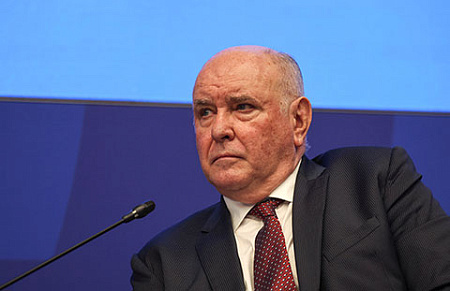
The negotiation process to resolve the conflict between Moscow and Kiev has moved to the stage of agreeing on technical details. Expert-level consultations between the United States and Russia were held in Riyadh. The resumption of the Black Sea Grain Initiative, which provides for the free movement of agricultural goods across the Black Sea, was discussed. The American and Ukrainian delegations met in Riyadh. Officials from the three countries expressed satisfaction with the discussion, without delighting journalists with details.
The Ukrainian-American talks were held in the same place as the Russian-American ones, in Riyadh, but a day earlier. Their participant, the Minister of Defense of Ukraine Rustem Umerov, called his conversation with the Americans “productive and focused,” but did not go into details.
“We discussed key issues, including energy,” he wrote on a social network, without revealing whether he had talked to the Americans about resuming the grain deal. The Ministry of Foreign Affairs of Ukraine, in turn, reported that the parameters of “various ceasefire regimes” were being determined in Riyadh. At the same time, both the Ukrainian Defense Minister and Ukrainian diplomats agreed that the meeting was more technical than dedicated to working out some final agreements.
Russian Presidential spokesman Dmitry Peskov was more specific in defining the topic of the Russian-American talks. “Today, the issue of the Black Sea Initiative and all aspects related to the resumption of this initiative are on the agenda. It was President Trump’s proposal, and President Putin agreed to it. It was with this mandate that our delegation went to Riyadh,” he said.
The Black Sea Initiative with the participation of the Russian Federation, Ukraine, the United Nations and Turkey operated from the summer of 2022 to the summer of 2023 and was not extended, as Moscow considered that the part of the grain deal concerning the Russian Federation was not being implemented by the West. The Russian bank responsible for operations within its framework was not connected to the SWIFT system, and other obstacles to the export of Russian food and fertilizers were not eliminated.
The negotiations in Riyadh are the first and probably not the last of this kind. They started in the morning and were not completed at the time of signing the number. “Not every negotiation necessarily ends with some large-scale documents and agreements. It is important to keep in touch all the time and understand each other’s point of view. We are succeeding,” Grigory Karasin, head of the Federation Council’s International Affairs Committee, told reporters during a break in the discussion. In addition to him, the Russian delegation included Sergei Beseda, an adviser to the director of the FSB. The Russian-American talks in Riyadh generally stood out from other events of this kind that have taken place recently, already by the composition of the participants. The resumption of the grain deal was negotiated not by high-ranking officials of foreign ministries and presidential administrations, but by people who had considerable experience in, so to speak, behind-the-scenes diplomacy and politics. This applies not only to the Russian side (let’s recall how much the Western press wrote about the role of the Conversation in the preparation of the Russian operation in Ukraine), but also to the Americans.
The negotiations in Riyadh were attended by Andrew Peake, Senior Director for Europe and Eurasia at the National Security Council, and Michael Anton, Director of Political Planning at the State Department, people with very interesting biographies. Peak is a veteran of the first Trump administration, formerly a military intelligence officer. For several years, he oversaw the Middle East area of the National Security Council and for three months headed the European and Eurasian (including Russian) areas in it, until he resigned, becoming involved in some kind of investigation. Its details are unknown, except that it was apparently connected with Ukraine and ended in nothing for the Peak. He wasn’t even denied access to classified documents. Trump considered the investigation to be the machinations of his opponents and, having come to power, transferred the same direction to the leadership of the Peak in the National Security Council as in his first term.
Anton has been a speechwriter for several prominent Republican politicians (including President George W. Bush) and became widely known in 2016 as a conservative publicist. He wrote the manifesto of radical Trump supporters, “Elections like Flight 93” (an allusion to Flight 93 hijacked by terrorists on September 11, 2001 and aimed at the Twin Towers). Anton declared in it that America needed not gradual changes, the time of which has passed and will not return, but a radical and rapid breakdown of existing orders and rules. “The 2016 elections are an analogue of Flight 93: take over the cockpit or die… Perhaps you – or the leader of your party – will break into the cockpit, having no idea how to control or land the plane. There is not the slightest guarantee that you will land the plane, but if you don’t try, you will definitely die,” Anton wrote. Trump liked this text so much that he invited its author to work for the National Security Council. Anton left there 14 months later, reportedly disappointed in the president, after John Bolton, a supporter of the traditional foreign policy of the Republican administrations, was appointed his immediate superior. Apparently, Trump has retained his trust in him. Therefore, when he returned to the White House, he offered Anton a post at the State Department. Bolton is now one of the most active critics of Trump’s foreign policy.
Anton is also known for his unusual hobby, or rather, his second specialty. He is a professional chef, a graduate of the famous International Culinary Center in New York. In his spare time at the White House, Anton worked in the presidential kitchen. According to The New York Times, he devoted his last day at the National Security Council to preparing dinner for French President Emmanuel Macron, who was arriving to meet with Trump.
